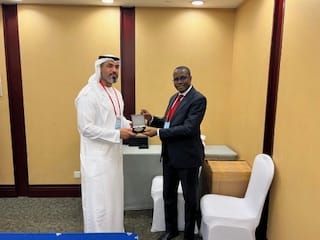The Chairman of the Independent Corrupt Practices and Other Related Offences Commission (ICPC), Dr. Musa Adamu Aliyu, SAN has urge global authority and more technologically advanced countries to assist developing countries to bridge the gaps in terms of technological tools and training of personnel to face the emerging trends in tackling the menace of corruption and other related crimes.
He stated this while delivering his speech at the ongoing high-level forum of the 5th plenary of the Global Network holding in Beijing, China.
According to the ICPC boss, there was need for the work of the Globe Network to impact heavily in the fight against corruption, money laundering, terrorism financing and trans-border crimes, which have remained hydra monster not just in developing countries but has now become a global concern that needs more efforts to mitigate.
’’Corruption is an ugly hydra-headed monster and a cankerworm that undermine the fabric of every society, it is not respecter of any nation and does not differentiate between the developed and the developing countries, it constitutes a serious threat to good governance, rule of law. Peace and security and undermine development and engenders poverty” he said.
Continuing, he revealed that the ICPC in particular and other anti-corruption agencies are aware of the complex nature most of the white-collar crimes have assumed and continue to assume with the convoluted nature of their accomplices and enablers.
“The need therefore to understand and demystify the workings of these crimes through collaboration, cooperation and technology can never by overemphasized”, he stated.
He added that the plenary gives us the opportunity not just to assess the growth of the network in terms of membership and observer states, but also share experiences in terms of advancement made by member authorities to tackle this monster of corruption and other related crimes. These shared experiences, the bilateral and multi-lateral meetings, all give us opportunities to close gaps which ordinarily we cannot do alone.
By working together, member authorities can leverage on their unique strengths and mandates to build a united front against corruption and related vices whilst fostering a more transparent and accountable systems.
To sustain these partnerships, Dr. Aliyu emphasized the need for regular communication, mutual trust, and shared commitments to integrity and transparency. This collaboration enables law enforcement authorities to amplify their impact and work towards corruption-free societies.
On the sidelines of the event, Dr. Aliyu held bilateral discussions with Muhammad Al-Qubaisi, the General Director of the United Arab Emirates’ Accountability Authority, focusing on collaboration, information sharing and capacity building in corruption prevention and enforcement between the two agencies.

